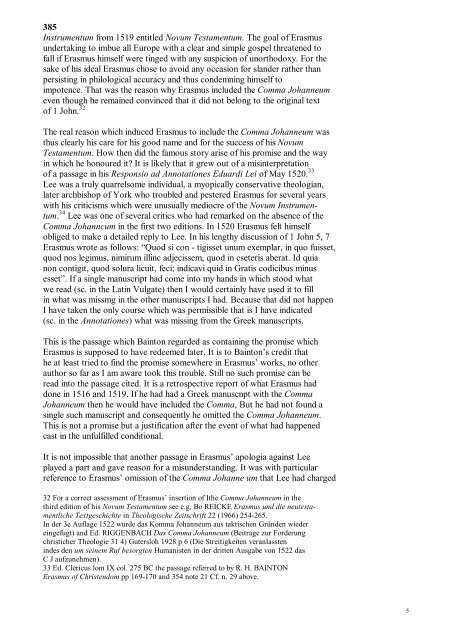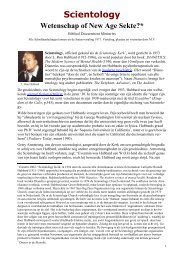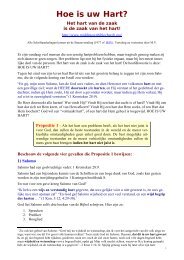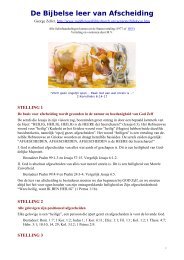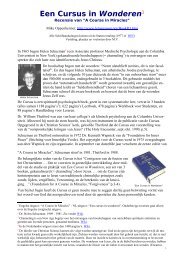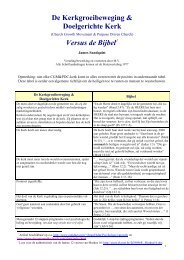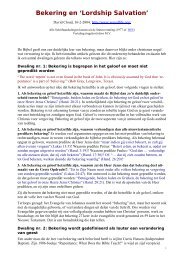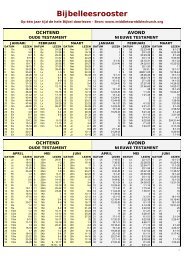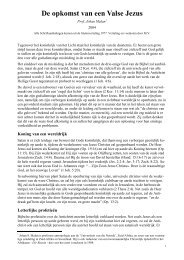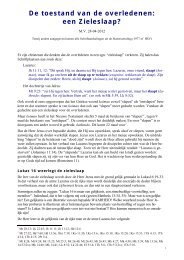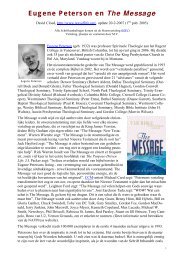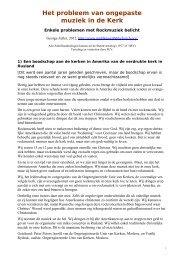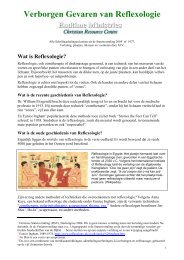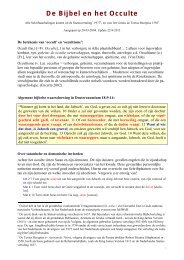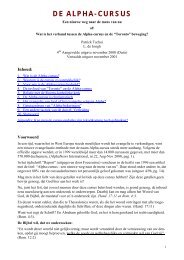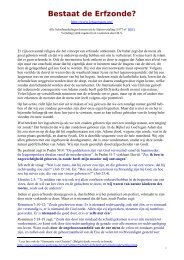erasmus and the comma johanneum - Marc Verhoeven
erasmus and the comma johanneum - Marc Verhoeven
erasmus and the comma johanneum - Marc Verhoeven
Create successful ePaper yourself
Turn your PDF publications into a flip-book with our unique Google optimized e-Paper software.
385<br />
Instrumentum from 1519 entitled Novum Testamentum. The goal of Erasmus<br />
undertaking to imbue all Europe with a clear <strong>and</strong> simple gospel threatened to<br />
fall if Erasmus himself were tinged with any suspicion of unorthodoxy. For <strong>the</strong><br />
sake of his ideal Erasmus chose to avoid any occasion for sl<strong>and</strong>er ra<strong>the</strong>r than<br />
persisting in philological accuracy <strong>and</strong> thus condemning himself to<br />
impotence. That was <strong>the</strong> reason why Erasmus included <strong>the</strong> Comma Johanneum<br />
even though he remained convinced that it did not belong to <strong>the</strong> original text<br />
of 1 John. 32<br />
The real reason which induced Erasmus to include <strong>the</strong> Comma Johanneum was<br />
thus clearly his care for his good name <strong>and</strong> for <strong>the</strong> success of his Novum<br />
Testamentum. How <strong>the</strong>n did <strong>the</strong> famous story arise of his promise <strong>and</strong> <strong>the</strong> way<br />
in which he honoured it? It is likely that it grew out of a misinterpretation<br />
of a passage in his Responsio ad Annotationes Eduardi Lei of May 1520. 33<br />
Lee was a truly quarrelsome individual, a myopically conservative <strong>the</strong>ologian,<br />
later archbishop of York who troubled <strong>and</strong> pestered Erasmus for several years<br />
with his criticisms which were unusually mediocre of <strong>the</strong> Novum Instrumen-<br />
tum. 34 Lee was one of several critics who had remarked on <strong>the</strong> absence of <strong>the</strong><br />
Comma Johanncum in <strong>the</strong> first two editions. In 1520 Erasmus felt himself<br />
obliged to make a detailed reply to Lee. In his lengthy discussion of 1 John 5, 7<br />
Erasmus wrote as follows: “Quod si con - tigisset unum exemplar, in quo fuisset,<br />
quod nos legimus, nimirum illinc adjecissem, quod in cseteris aberat. Id quia<br />
non contigit, quod solura licuit, feci; indicavi quid in Gratis codicibus minus<br />
esset”. If a single manuscript had come into my h<strong>and</strong>s in which stood what<br />
we read (sc. in <strong>the</strong> Latin Vulgate) <strong>the</strong>n I would certainly have used it to fill<br />
in what was missmg in <strong>the</strong> o<strong>the</strong>r manuscripts I had. Because that did not happen<br />
I have taken <strong>the</strong> only course which was permissible that is I have indicated<br />
(sc. in <strong>the</strong> Annotationes) what was missing from <strong>the</strong> Greek manuscripts.<br />
This is <strong>the</strong> passage which Bainton regarded as containing <strong>the</strong> promise which<br />
Erasmus is supposed to have redeemed later. It is to Bainton’s credit that<br />
he at least tried to find <strong>the</strong> promise somewhere in Erasmus’ works, no o<strong>the</strong>r<br />
author so far as I am aware took this trouble. Still no such promise can be<br />
read into <strong>the</strong> passage cited. It is a retrospective report of what Erasmus had<br />
done in 1516 <strong>and</strong> 1519. If he had had a Greek manuscnpt with <strong>the</strong> Comma<br />
Johanneum <strong>the</strong>n he would have included <strong>the</strong> Comma, But he had not found a<br />
single such manuscript <strong>and</strong> consequently he omitted <strong>the</strong> Comma Johanneum.<br />
This is not a promise but a justification after <strong>the</strong> event of what had happened<br />
cast in <strong>the</strong> unfulfilled conditional.<br />
It is not impossible that ano<strong>the</strong>r passage in Erasmus’ apologia against Lee<br />
played a part <strong>and</strong> gave reason for a misunderst<strong>and</strong>ing. It was with particular<br />
reference to Erasmus’ omission of <strong>the</strong> Comma Johanne um that Lee had charged<br />
32 For a correct assessment of Erasmus’ insertion of I<strong>the</strong> Comma Johanneum in <strong>the</strong><br />
third edition of his Novum Testamentum see e.g. Bo REICKE Erasmus und die neutesta-<br />
mentliche Textgeschichte in Theologische Zeitschrift 22 (1966) 254-265.<br />
In der 3e Auflage 1522 wurde das Komma Johanneum aus taktischen Gründen wieder<br />
eingefugt) <strong>and</strong> Ed. RIGGENBACH Das Comma Johanneum (Beitrage zur Forderung<br />
christicher Theologie 31 4) Gutersloh 1928 p 6 (Die Streitigkeiten veranlassten<br />
indes den um seinem Ruf besorgten Humanisten in der dritten Ausgabe von 1522 das<br />
C J aufzunehmen).<br />
33 Ed. Clericus lom IX col. 275 BC <strong>the</strong> passage referred to by R. H. BAINTON<br />
Erasmus of Christendom pp 169-170 <strong>and</strong> 354 note 21 Cf. n. 29 above.<br />
5


